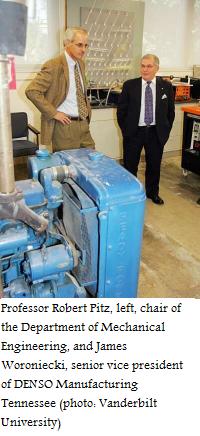The U.S. House has passed the Energy Independence and Security Act (H.R. 6) by a vote of 235 to 181. The measure expands the Renewable Fuel Standard by seven times to 36 billion gallons a year by 2022… with 21 billion gallons of ethanol coming from cellulosic feedstocks, such as wood scraps… and requiring that 500 million gallons of biodiesel and biomass-based diesel fuel be blended into the diesel pool in 2009, gradually ramping up to one billion gallons by 2012.
The bill also extends the biodiesel tax incentive through the end of 2010. The incentive helps make biodiesel competitive with petroleum diesel fuel. It will also close the “splash and dash” loophole, ensuring that foreign-produced biodiesel cannot be transshipped through the U.S. just to claim the biodiesel tax incentive.
The news is welcomed by the National Biodiesel Board and the Renewable Fuels Association:
 “This legislation is an all-around win for achieving America’s energy and environmental goals,” said Joe Jobe, NBB CEO. “We appreciate the House’s willingness to support the U.S. biodiesel industry and the important role biodiesel will play in reducing our dependence on foreign oil and reducing greenhouse gas emissions.”
“This legislation is an all-around win for achieving America’s energy and environmental goals,” said Joe Jobe, NBB CEO. “We appreciate the House’s willingness to support the U.S. biodiesel industry and the important role biodiesel will play in reducing our dependence on foreign oil and reducing greenhouse gas emissions.”
 Commending those supporting this shift in energy policy direction in this country, Renewable Fuels Association President Bob Dinneen issued the following statement:
Commending those supporting this shift in energy policy direction in this country, Renewable Fuels Association President Bob Dinneen issued the following statement:
“The House of Representatives took an important step forward today in ensuring a stronger and more sustainable energy and environmental future for this country. This bill recognizes the critical importance of diversifying our nation’s motor fuel supply by increasing the use of renewable fuels like ethanol.
“Importantly, the renewable fuels provisions of this bill take a pragmatic approach to ensuring that the promise of advanced biofuels like cellulosic ethanol is realized. By requiring that nearly two-thirds of the new 36 billion gallon goal must come from advanced biofuels, House leaders have provided the necessary market to foster the continued investment and development of the cellulosic arm of the U.S. ethanol industry.
The measure is paid for by $21 billion in new taxes, mostly on oil companies… which, according to this story in the International Herald Tribune, could cause trouble in the U.S. Senate:
Senate Majority Leader Harry Reid said he will try to bring it up Friday. Senate Republicans said they will try to strip out the new oil taxes and a requirement that utilities generate more electricity from windmills, solar panels and other renewable sources.
“I don’t think anybody can predict what will happen in the Senate,” (Speaker of the House Nancy) Pelosi conceded after the vote, but added confidently — and with a hint of possible further compromise: “We will have a bill.”
The White House has promised to veto the bill if the House version passes the Senate.
 This press release from the National Biodiesel Board (NBB) says the standards came during ASTM meetings this week in Phoenix after six years of collaboration by industry representatives and will mean more automakers will approve B20 in their engines:
This press release from the National Biodiesel Board (NBB) says the standards came during ASTM meetings this week in Phoenix after six years of collaboration by industry representatives and will mean more automakers will approve B20 in their engines:

 In urging Senators to block a vote on the bill, Sen. Pete Domenici of New Mexico, the ranking Republican on the Senate Energy and Natural Resources Committee, argued: “This is not a good bill, but it can be turned into a great bill.”
In urging Senators to block a vote on the bill, Sen. Pete Domenici of New Mexico, the ranking Republican on the Senate Energy and Natural Resources Committee, argued: “This is not a good bill, but it can be turned into a great bill.” Hurt sees continual price rises in the corn, soybean and wheat markets through 2010 with a gradual settling leading up to that time and then a leveling off period.
Hurt sees continual price rises in the corn, soybean and wheat markets through 2010 with a gradual settling leading up to that time and then a leveling off period. The two biggest biodiesel producers in Wisconsin have combined forces to put the state’s second largest biodiesel plant online by the end of the year.
The two biggest biodiesel producers in Wisconsin have combined forces to put the state’s second largest biodiesel plant online by the end of the year. Commending those supporting this shift in energy policy direction in this country, Renewable Fuels Association President Bob Dinneen issued the following statement:
Commending those supporting this shift in energy policy direction in this country, Renewable Fuels Association President Bob Dinneen issued the following statement: The upcoming National Biodiesel Board’s 2008 National Biodiesel Conference & Expo, February 3-6th at the Gaylord Palms Resort & Convention Center in Orlando, Florida, will be focusing on developing the feedstocks to make the green fuel.
The upcoming National Biodiesel Board’s 2008 National Biodiesel Conference & Expo, February 3-6th at the Gaylord Palms Resort & Convention Center in Orlando, Florida, will be focusing on developing the feedstocks to make the green fuel. The National Biodiesel Board has joined some key members of the House Agriculture Committee to rally for the expansion of the Renewable Fuels Standard (RFS).
The National Biodiesel Board has joined some key members of the House Agriculture Committee to rally for the expansion of the Renewable Fuels Standard (RFS). The Energy Bill scheduled for consideration in the U.S. House contains a provision to use clean-burning, domestically produced renewable fuels to promote energy independence by expanding the existing RFS to 36 billion gallons by 2022. The proposal would also provide for a renewable requirement in diesel fuel. It would be met by biodiesel and other biomass-based diesel fuels. The legislation specifically requires that 500 million gallons of biodiesel and biomass-based diesel fuel be blended into the diesel pool in 2009, gradually ramping up to one billion gallons by 2012.
The Energy Bill scheduled for consideration in the U.S. House contains a provision to use clean-burning, domestically produced renewable fuels to promote energy independence by expanding the existing RFS to 36 billion gallons by 2022. The proposal would also provide for a renewable requirement in diesel fuel. It would be met by biodiesel and other biomass-based diesel fuels. The legislation specifically requires that 500 million gallons of biodiesel and biomass-based diesel fuel be blended into the diesel pool in 2009, gradually ramping up to one billion gallons by 2012. A new study released today by the
A new study released today by the  Members of Congress and representatives from a variety of organizations held a media event Wednesday morning in support of an increased Renewable Fuels Standard (RFS) in the Energy Bill.
Members of Congress and representatives from a variety of organizations held a media event Wednesday morning in support of an increased Renewable Fuels Standard (RFS) in the Energy Bill. Congressman Eliot Engel (D-NY) described his conversion to being an ethanol supporter. “As a member of the Energy and Commerce Committee for many years I voted against the ethanol mandate,” Engel said. “I changed my position 180 degrees, and I changed my position because it’s good for America.”
Congressman Eliot Engel (D-NY) described his conversion to being an ethanol supporter. “As a member of the Energy and Commerce Committee for many years I voted against the ethanol mandate,” Engel said. “I changed my position 180 degrees, and I changed my position because it’s good for America.” All of the speakers noted the importance of the RFS to cellulosic ethanol development, which is still in its infancy. In the meantime, Congresswoman Stephanie Herseth Sandlin (D-SD) said, “Conventional corn ethanol is the bridge we need to move forward.”
All of the speakers noted the importance of the RFS to cellulosic ethanol development, which is still in its infancy. In the meantime, Congresswoman Stephanie Herseth Sandlin (D-SD) said, “Conventional corn ethanol is the bridge we need to move forward.” Vanderbilt University is the recipient of a $100,000 grant from Japanese auto components supplier, DENSO Corporation to put in a state-of-the-art biodiesel tester.
Vanderbilt University is the recipient of a $100,000 grant from Japanese auto components supplier, DENSO Corporation to put in a state-of-the-art biodiesel tester.